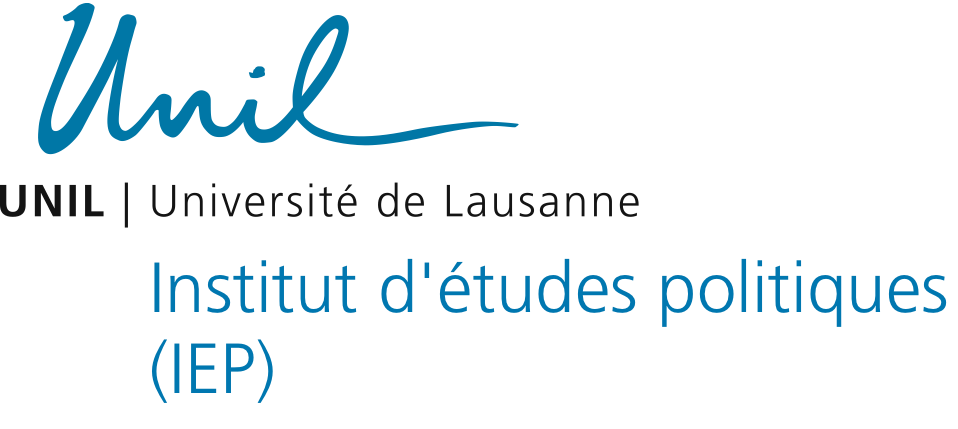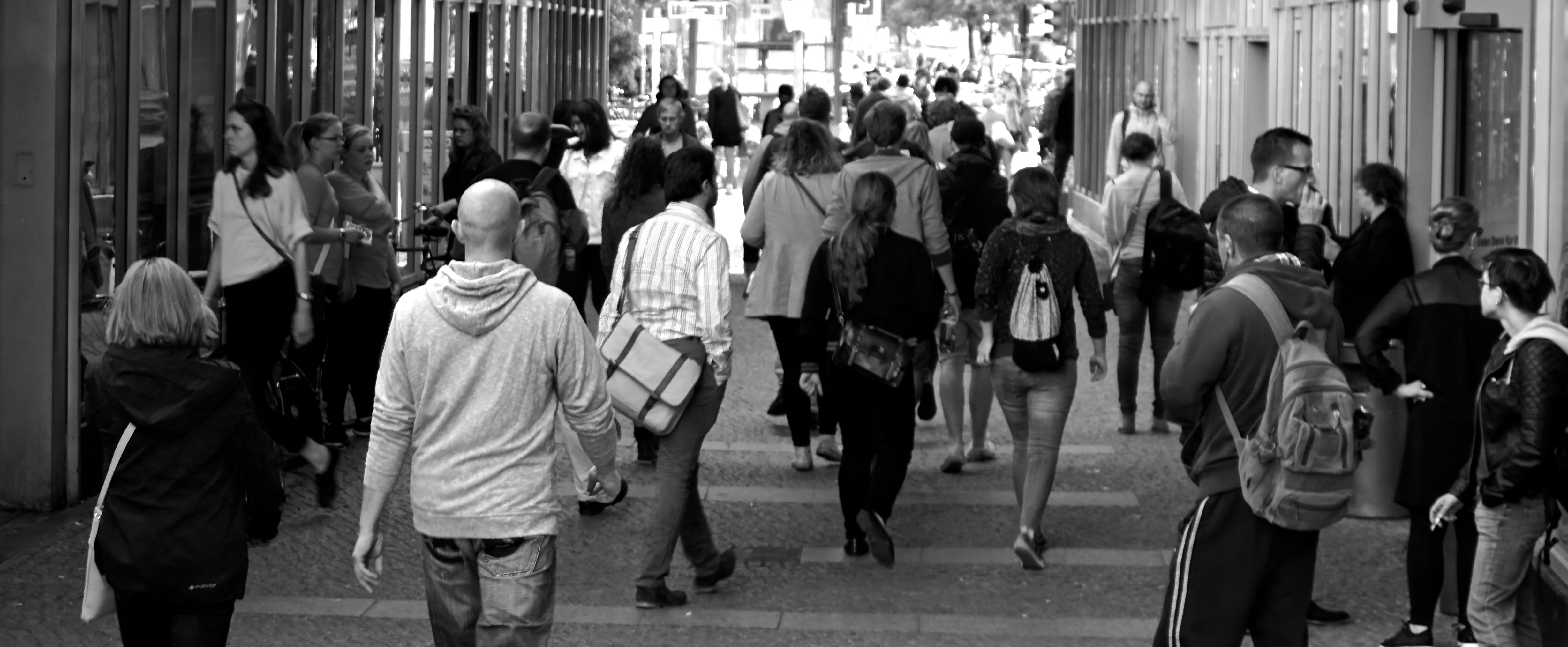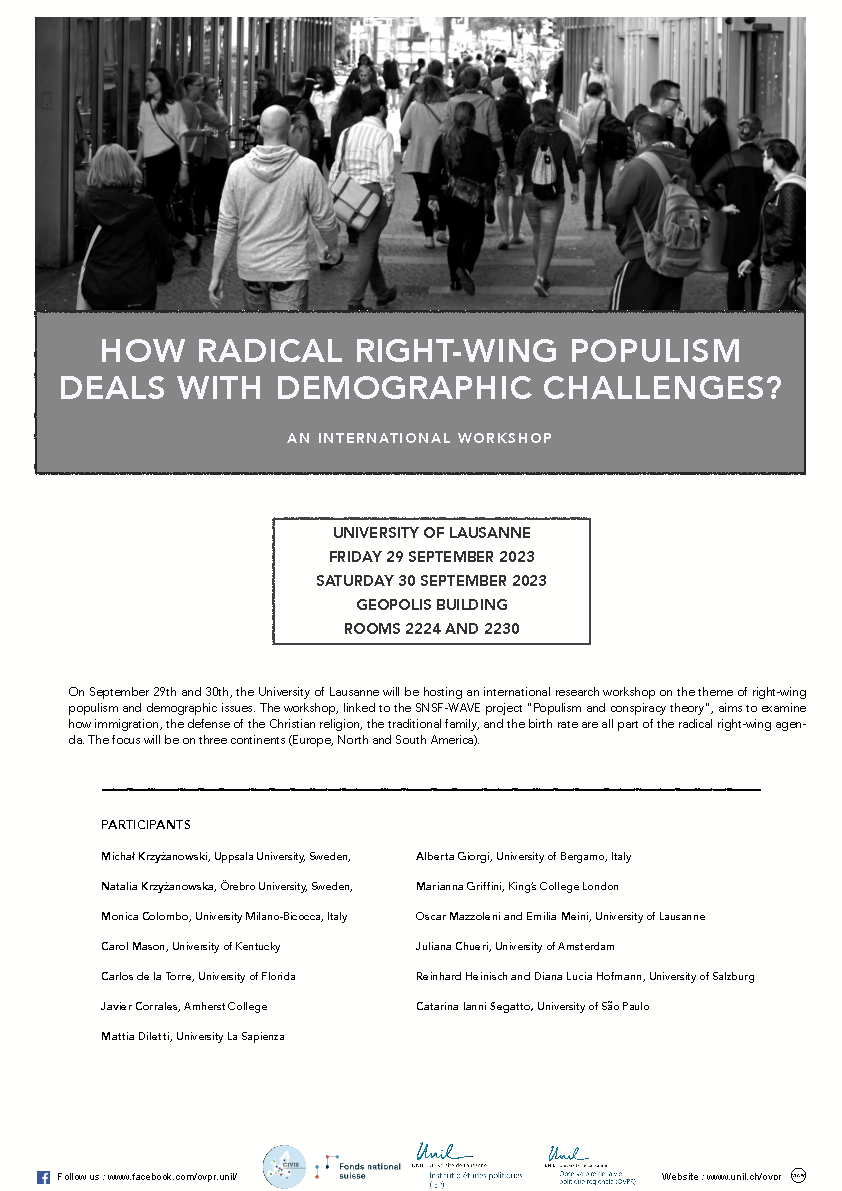Organisation
Oscar Mazzoleni, Emilia Meini, Antoine Lehmann (OVPR, Université de Lausanne)
Vendredi 29 septembre 2023 au samedi 30 septembre 2023 - Géopolis - Salles 2224 GEO et 2230 GEO
*Detailed program in English below
Les 29 et 30 septembre prochains aura lieu à Géopolis un workshop de recherche international sur le thème du populisme de droite et des enjeux démographiques. Le workshop, lié au projet FNS-WAVE « Populism and conspiration theory », vise à rendre compte de la manière dont l’immigration, la défense de la religion chrétienne, de la famille traditionnelle et de la natalité, font parties prenantes de l’agenda de la droite populiste. Le regard sera porté sur trois continents (Europe, Amérique du Nord et Amérique du Sud).
__
In the last decades, new or radicalized actors have become electorally and politically successful in many contemporary democracies. Such actors have been often included in the “family” of radical right-wing populism and have put migrants and immigration at the core of their agenda and narratives across continents. In fact, immigrant flows, mainly from the poorer to the richer countries, have opened a wide and persistent political opportunity for radical right-wing populism.
However, immigration is not the sole issue of this ideological “family” and the migration flow is not the unique structural opportunity framed and exploited by radical right-wing populism. Nowadays new issues take increasing relevance concerning structural, social and cultural transformations, such as the attack against “gender ideologies”, abortion, LGBTQ rights, Islamophobia, etc.
However, academic literature has often considered these plural sets of issues as separate research topics. The depenalization of abortion, recognition of same-sex marriage, fluid sexuality, etc. are framed by radical right-wing populism as the causes of the crisis of the traditional family model. Immigration from non-European/non-Christian countries is seen both as prosperity and threat, as a danger to the Christian/Western/traditional family’s model. At the same time, the defense of the traditional family model is presented as a crucial response against demographic threats undermining the “true” people (e.g. declining birth rates, decreasing shares of Christians and white people, etc.).
The workshop deals with a redefinition and a dramatization of the “cultural backlash” by radical right-wing populism on demographic-related issues in many democracies, in Europe and the Americas. Right-wing populism ideologically politicizes and takes advantage of official projections which foresee, for instance, a significant decrease of the EU residents in the next decades. The main official explanation of the EU demographic decline is the lowering of birth rates and the growth of the aging population. For the US, the demographic decline mainly refers to the non-Hispanic white population. In Brazil, population projections also expect a decreasing trend after 2050 and a shrinking proportion of the white population.
The workshop will address the following main research question:
How/to what extent the current radical right-wing populist agenda/issues/ideological stances might be interpreted as responses to key demographic challenges, connected to changes related to gender, sexual relations, and family models?
The workshop pursues the following goals:
· Connecting scholars interested in studying radical right-wing populism but working in different and often separate topics/sub-fields (immigration, gender, family-related issues, religion, etc.);
· Highlighting the different framing of demographic-related issues by radical right-wing populism in different contexts, assuming each actor (i.e. leader, movement, party) shapes and frames demographic challenges in different ways;
· Developing and sharing a theoretical discussion on radical-right-wing populism and demographic populism;
· Drawing a collective and cohesive project of an edited book.
Friday 29th September 2023
Géopolis, Room 2224
09:00-09:30 Introduction
09:30-10:15
Michał Krzyżanowski, Uppsala University, Sweden, Natalia Krzyżanowska, Örebro University, Sweden, Monica Colombo, University Milano-Bicocca, Italy
Re/Definitions of the ‘Family’ in/and the Discourse of European Right Wing Populist Parties: Strategies of Pre-Legitimising and Normalising the Politics of Exclusion
Discussant: Marianna Griffini
10:15-11:00
Carlos de la Torre, University of Florida
Comparing the racial and gender projects of right and left populists in Latin America
Discussant: Javier Corrales
Coffee break
11:15-12:00
Carol Mason, University of Kentucky
Opposing Abortion, Protecting Women, and Transnationalizing US Populism
Discussant: Mattia Diletti
12:00-12:45
Javier Corrales, Amherst College
Polarization, Policy Extremism, and Homophobia under Populist Governments
Discussant: Carol Mason
Lunch break
14:15-15:00
Alberta Giorgi, University of Bergamo, Italy
Grounding anti-immigration and pro-traditional family values on science
Discussant: Michał Krzyżanowski
15:00-15:45
Marianna Griffini, King’s College London
Demographic entanglements: colonial reflections in the discourse and policy of the populist radical right on natality
Discussant: Juliana Chueri
Coffee break
16:00-16.45
Oscar Mazzoleni and Emilia Meini, University of Lausanne
The Challenge of conspirational right-wing populism. The Great Replacement in Western Europe
Discussant: Reinhard Heinisch
Saturday 30th September 2023
Géopolis, Room 2230
9:30-10:15
Juliana Chueri, University of Amsterdam, Catarina Ianni Segato, University of São Paulo
Bolsonaro's Gender Politics: Social Policies and Attitudes Among Female Supporters
Discussant: Alberta Giorgi
10:15-11:00
Reinhard Heinisch and Diana Lucia Hofmann, University of Salzburg
The Effects of Othering: Anti-Islamic Mobilization in Austria
Discussant: Oscar Mazzoleni
Coffee break
11:15-12:00
Mattia Diletti, University La Sapienza
Transatlantic nostalgia. Traditional family and global conservative networks
Discussant: Carlos de la Torre
12:00-12:45
Final remarks
14:30-15:30
CIVIS Meeting
___
This event is organized with the support of :
.png)


.png)


